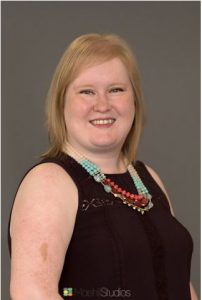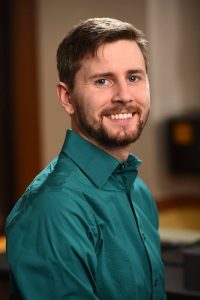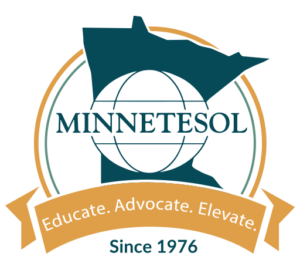Do you know your MinneTESOL Executive Board members? Get to know them here! We will introduce a new board member every two weeks!
Erin Cary

What is your role on the MinneTESOL Executive Board?
2nd Vice President and MELEd Conference Co-chair
What are some of your responsibilities in this role?
As a MinneTESOL Executive Board member, I am able to make suggestions and vote on decisions we make as an organization. I’m particularly excited to be involved with any work we’re doing that directly supports educators and advocates for students, because of course, that’s what inspires all of us to serve on the board in the first place. My major function is working with my co-chair, Darren LaScotte (with tons of help from Kate Clements, MinneTESOL’s Executive Assistant) to organize the MELEd conference in the fall. We’re the point people when it comes to the venue, food, program, and a million other details, and get to collaborate with rest of the Executive Board and our many committee chairs, volunteers and vendors to make the conference fun and productive for everyone. This is my second year co-chairing MELEd, and I’m glad to have had one conference as co-chair under my belt already, because I can picture how all this work culminates in bringing together over 1200 people from our field to share ideas and reflect on our practice in this field we love.
What is your favorite part about being a MinneTESOL member/part of the board?
I think my favorite aspect of this role is the opportunity to get to know and work alongside brilliant ABE professionals from around the state, teaching in so many contexts I don’t normally encounter. I feel like I’m constantly able to grow professionally and in my teaching practice through exposure to their talents and innovative approaches.
In what capacity do you work with ELLs and the field of TESOL?
I’m an Intermediate/Advanced ELL Instructor and Education Program Manager for Lyndale Education Program, a program of Lyndale Neighborhood Association in south Minneapolis. We hold morning, afternoon and evening adult ELL classes in community spaces in our neighborhood for largely Somali and Latino community members, and also partner with an organization in NE Minneapolis to provide an adult basic education classroom for their re-entry program, for participants transitioning into the community from incarceration. I’ve been teaching the morning ELL class for 4 years and came on as manager about 2 years ago. We’ve got a tiny education staff (just 4!) and our programming is still young (about 5 years old) but we rely on student feedback to keep expanding our offerings and do our best to keep deepening our relationships in the community. It’s a very gratifying position for me, to have such awesome colleagues, partners and students and to be part of making a mark in a great neighborhood.
How did you get into the field of TESOL?
I did most of a Ph.D. in German literature (anyone want to discuss late 19th-century Austro-Hungarian literature sometime? No? Huh, that’s weird) but decided higher ed and the professorial life wasn’t for me. So I had several years of classroom teaching under my belt, albeit in German, and in 2009, a college friend asked if I would be interested in subbing for her program’s adult ELL classed in St. Paul. I felt at home immediately, and learned more about teaching that supports students in weeks of subbing and watching other teachers at that site than I had in years of previous experience. ELL instructors are truly in it to empower students toward their own success, and I fell in love with my colleagues as quickly as I did the students and the field. I’ve been teaching adult ELLs ever since, across St. Paul and Minneapolis.
Is there anything else you’d like the membership to know about you?
I live in the Union Park area of St. Paul with my fiance, Rob–in fact, we are planning a wedding this August in addition to my working on the MELEd conference, plus we are looking for a house. So if you see me sneaking a nap in a coffee shop somewhere, don’t worry, it’s a necessary survival technique and I’m totally fine.
Darren LaScotte

What is your role on the MinneTESOL Executive Board for 2017?
3RD Vice President and Conference Co-Chair
What are some of your responsibilities in this role?
I serve on the MinneTESOL Executive Board and vote on current happenings. My main responsibilities fall mostly in line with the annual Minnesota English Learner Education Conference. With the 2nd Vice President and Conference Co-Chair, Erin Cary, we plan the ins and outs of the annual conference. This includes securing conference space, food and drink, etc., for the event itself, in addition to creating the conference program and overseeing subcommittees that review proposal submissions, recruit volunteers, technology, items for the silent auction… you name it. If something’s at the conference, Erin and I have surely been involved.
What is your favorite part about being a MinneTESOL member/part of the board?
Are you ready for a cliché? My favorite part about being a MinneTESOL member/ part of the board is –you guessed it– the people. I really enjoy meeting and working with TESOL professional across interest sections and student populations. Through MinneTESOL, I’ve connected with others from across the United States and even had the opportunity to go to the TESOL International Conference. I’m very happy to be a part of such an interconnected organization.
In what capacity do you work with ELLs and the field of TESOL?
I am currently adjunct faculty in the Minnesota English Language Program and in the University of Minnesota’s Department of Curriculum and Instruction. I mostly teach English courses to international students, but part of my job is also teacher training in the TESL minor program. In addition to my day job, I also do a lot of volunteer work with the Alliance Française of Minneapolis/St. Paul. Those are of course French language based events/ workshops, but there’s still a connection to second language teaching, which I think is important.
How did you get into the field of TESOL?
I took a somewhat windy path into the field of TESOL… but not as circuitous as others’ (as I have learned)! I completed my Bachelor’s in French Studies and originally aimed to continue school in French and eventually teach at the university-level (in French). Following my BA, I decided to complete a Master’s degree in French linguistics, with a specialization in Teaching French as a Foreign Language at a university in the south of France. My coursework in second language teaching sparked a new interest, and I decided to change course a bit and widen my horizons by beginning a new Master’s in second language education (the MA in TESOL, to be exact). My intent was not to discontinue my work in French, but add English language teaching to my repertoire. Since completing the MA in TESOL, I have been fortunate enough to present at a range of national and international conferences, publish in a few academic journals, and work in a job I love and care about deeply.
Is there anything else you’d like the membership to know about you?
I live in NE Minneapolis with my boyfriend, Michael, and dog, Xander. If you live in the metro area, you might find me at local dog parks and other “hot spots” where dogs are permitted. One thing people find strange, I guess, is that I don’t like cookies (awful little things). But, don’t worry, I’ll make sure there are plenty of them for you all at the annual fall conference.

